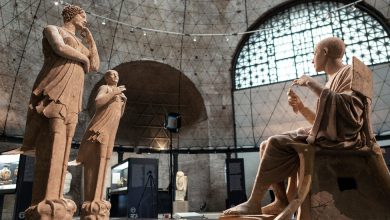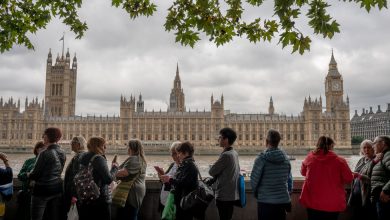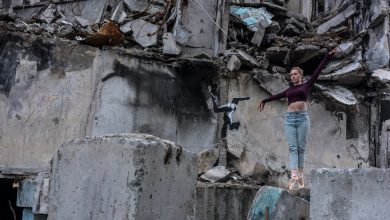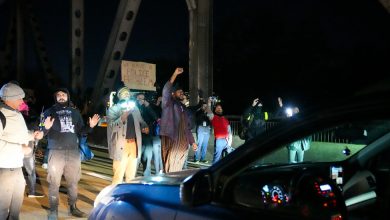A Chicago Mayoral Hopeful Who Took on Hard-to-Fix Schools Faces a Political Shift
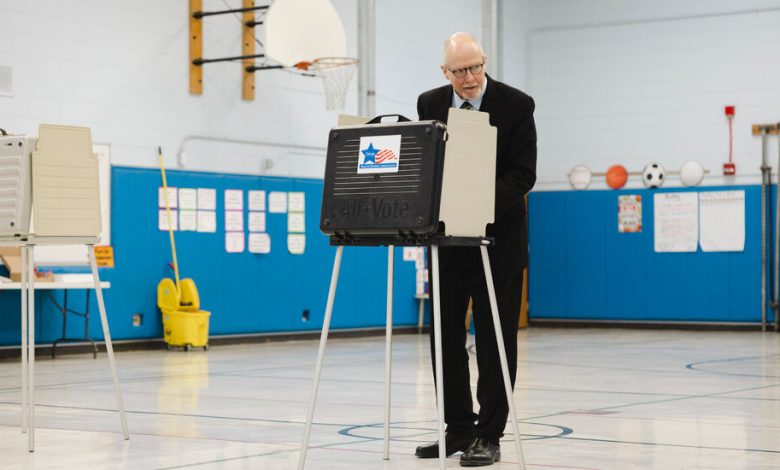
CHICAGO — Paul Vallas took control of Chicago Public Schools when the district was among the country’s most troubled. He went to Philadelphia to head up a teetering education system that the state had taken over. And after Hurricane Katrina washed away much of the New Orleans school district, he helped rebuild it.
Mr. Vallas built a reputation as the educational emergency responder of the 1990s and 2000s, someone sought out for the most challenging jobs. When he got to a new city, he moved quickly and forcefully, clashing at times with school boards and labor groups that objected to the pace and scope of his changes.
“I’ll do 10 things and maybe accomplish five of them as opposed to someone who will do two things and maybe accomplish one,” Mr. Vallas said in an interview.
One of two Democrats in Chicago’s mayoral runoff election on Tuesday, Mr. Vallas highlights his record of improving facilities, keeping schools open more hours and overhauling low-performing schools. He also forced out longtime educators, took a hard stance on student discipline and greatly expanded the number of charter schools, policies that earned him fans and enemies wherever he went.
Mr. Vallas, 69, has put his education record at the center of his campaign for mayor of Chicago, arguing that the city needs that brand of crisis management to lower crime and improve schools. Yet he faces a changed political era in which teachers’ unions have asserted their power and many Democrats have grown skeptical of the idea of school choice, which Mr. Vallas supports and was once widely embraced by his party.
Mr. Vallas is competing against Brandon Johnson, a county commissioner and former teacher who embodies the progressive critique of Mr. Vallas’s education philosophy. Mr. Johnson, a paid organizer for the last 12 years with the Chicago Teachers Union, has called for sweeping new investments in neighborhood schools and social programs. He wants to expand vocational programs, add resources for students who do not speak English and avoid closing schools with low enrollments. He has also been on the front lines of three work stoppages as his union clashed with two mayors and articulated a liberal vision for Chicago that extended well beyond schools.
In Mr. Johnson’s telling, Mr. Vallas is an out-of-touch administrator whose policies would not help Chicago’s poorest residents. And when Mr. Vallas first ran Chicago’s schools, Mr. Johnson said, he made the city’s entrenched problems even worse.
“The tale of two cities has been brought to us by Paul Vallas,” Mr. Johnson said. “He created a stratified system.”
Mr. Vallas’s embrace of school choice, including magnet schools, military-style academies and charters, was a central part of the crisis playbook that he began developing when he ran Chicago’s schools in the late 1990s. Back then, though, many liberals as well as conservatives saw charter schools as a way to improve struggling school districts like Chicago. Charter schools, which are privately run and publicly funded, are popular in many low-income neighborhoods as alternatives to regular public schools. Teachers’ unions, though, have often bitterly fought the expansion of charter schools, most of which are not unionized. The unions contend the schools deprive the public school system of resources.
Mr. Vallas came to Chicago’s schools from a finance role in Mayor Richard M. Daley’s City Hall instead of through the ranks of teachers and principals. He took over Chicago Public Schools in 1995 as Mr. Daley’s handpicked leader at a time of financial and educational crisis. The Illinois government, then controlled by Republicans, had just handed the mayor control of the system.
Mr. Vallas quickly embraced other alternatives to traditional neighborhood schools, including magnet schools and military-style academies.
His policies won praise from liberals who credited him with restoring order and raising test scores using a back-to-basics approach.
The Clinton-era New Democrats were ascendant, and Mr. Vallas in many ways epitomized the moment, approaching the job like a corporate executive; his Chicago Public Schools title, after all, was chief executive.
Under his leadership, the district placed faltering schools on academic probation, fired underperforming principals and ended social promotion, the practice in which failing students were advanced from grade to grade simply to keep them with their peers. The move helped him initially win over teachers. An official at the American Federation of Teachers hailed Mr. Vallas in 1997 for giving educators more leverage over students who were not doing their work.
“People thought he was better than sugar,” said Josephine Perry, an instructor for a union that represents service employees in Chicago.
Years later, though, much of what Mr. Vallas has spent his career championing — the tough disciplinary policies, the openness to charter schools — has lost some of its bipartisan sheen. Ms. Perry, who said she plans to vote for Mr. Johnson, summed up a concern of many Democrats: Mr. Vallas, she said, is “more aligned with Republican values.”
Though Mr. Vallas is a Democrat, he has campaigned on a tough-on-crime platform and is far more conservative than Mr. Johnson. Mr. Vallas has also received endorsements from conservative organizations, including the local chapter of the Fraternal Order of Police, and financial support from some prominent Republican donors.
The political divide on charter schools is complicated. A national poll last year by Education Next, an academic journal, found that a majority of Black people surveyed supported charter schools, while fewer than half of white people and Hispanic people did. Along party lines, Republicans supported charters at a far higher rate than Democrats.
Mr. Vallas says it is not an issue of Republicans versus Democrats. It is about teachers’ unions, which he said have become “more radicalized” with power to shape Democratic Party politics.
“The unions realized that they were losing ground, and I think it forced them to become much more political than they had been,” Mr. Vallas said.
Leaders of the Chicago Teachers Union, which has donated heavily to the Johnson campaign, said they had been defending public education in a city where mayors have repeatedly failed to invest properly in schools. Stacy Davis Gates, the union president, said she believed Mr. Vallas was going to close some schools and privatize others if elected mayor.
He “is going to marginalize Chicago Public Schools in a way that will make getting a public education almost impossible,” she said.
Mr. Vallas says he wants to expand high-performing charters in Chicago but has not called for eliminating neighborhood schools.
Though comparing academic achievement data over time is difficult, Mr. Vallas compiled a mixed record as a school executive in four cities that included notable successes as well as disappointments.
In Philadelphia, Mr. Vallas’s first stop after Chicago, proficiency in math and reading improved in the years after he arrived, according to a study by the RAND Corporation. But that study also found that privately managed schools in Philadelphia, which included some for-profit charter operators, performed no better than district-run schools, on average.
Ed Rendell, a Democrat who was governor of Pennsylvania for much of that time, said he believed that Mr. Vallas did a good job under trying conditions, even though not all of his ideas worked.
“He was an innovator,” Mr. Rendell said. “Some his innovations were good and had a positive impact. Some were well-meaning and well-targeted but didn’t work.”
Mr. Vallas’s tenure in Philadelphia ended after the district recorded a budget shortfall, which Mr. Rendell said “wasn’t a disaster” but also “wasn’t acceptable.”
Mr. Vallas was especially aggressive in spending on school construction, which was also a theme of his tenure in other cities with decaying school buildings.
“He always told me that if you send a kid to school in a school that has no paint on the walls and a heating system that doesn’t work and it hasn’t been cleaned,” Mr. Rendell said, “the kid’s going to figure out pretty fast that no one values their education.”
But the scale of the change he sought, and the idea that the system needed an overhaul, made him plenty of enemies. Kendra Brooks, now a member of the Philadelphia City Council, said she got started in politics after watching with dismay as Mr. Vallas made extensive changes to neighborhood schools while expanding charter and magnet programs. She described his tenure there as a failure that continues to hurt the city.
“When you restructure over 200,000 children into a new system, it’s not easy to just flip back to something else,” Ms. Brooks said.
Building a new system was exactly what Mr. Vallas was hired to do at his next stop in New Orleans. He arrived in 2007, nearly two years after Hurricane Katrina had washed away much of the school system, and had to start rebuilding before it was even clear how many students would be returning to the city.
To make it work, Mr. Vallas helped build a network of charter schools overseen by public officials but largely independent of the kind of bureaucracy typically associated with big-city school districts. A Tulane University study later found sustained improvement in achievement and graduation rates in the new, charter-centric school system that he developed.
“Paul Vallas came in to stabilize schools. He didn’t come in to do charter schools,” said Paul Pastorek, the former state education superintendent of education for Louisiana and Mr. Vallas’s boss in New Orleans. “But I think he recognized the value of charters when he came here.”
Still, Mr. Pastorek stressed that Mr. Vallas was more than willing to close charter schools that were faltering, citing a 2011 decision to shutter the Harriet R. Tubman School in the city’s Algiers neighborhood.
“Heavy political pressure was applied to keep it open,” Mr. Pastorek recalled. “Paul recommended the state board close it, and we did. Every school had to meet the same standard, including charters.”
From New Orleans, Mr. Vallas went to take over the schools in Bridgeport, Conn., in 2012. Bill Finch, who was mayor of Bridgeport at the time, said he was impressed with the speed with which Mr. Vallas addressed budget problems, created academic programs and injected energy into a long-struggling school system.
“We went from a disastrous situation to a normal situation,” Mr. Finch said. “And I think it was actually better than normal because Paul really innovated.”
But as in other cities, Mr. Vallas upset people with the pace and type of change he was proposing. He was ultimately forced to leave after courts ruled that he did not have the proper credentials to lead a Connecticut school district.
Now back in Chicago and running for mayor, Mr. Vallas continues to back charter schools and defend his education record against criticism that he breaks more than he fixes. He talks often about using schools “to fill gaps,” getting eyeglasses to children struggling to see and keeping buildings open into the evenings to keep students safe and engaged.
“I’ve always been able to multitask,” Mr. Vallas said. He added: “I felt I had to level the playing field.”
Julie Bosman and Dana Goldstein contributed reporting.


